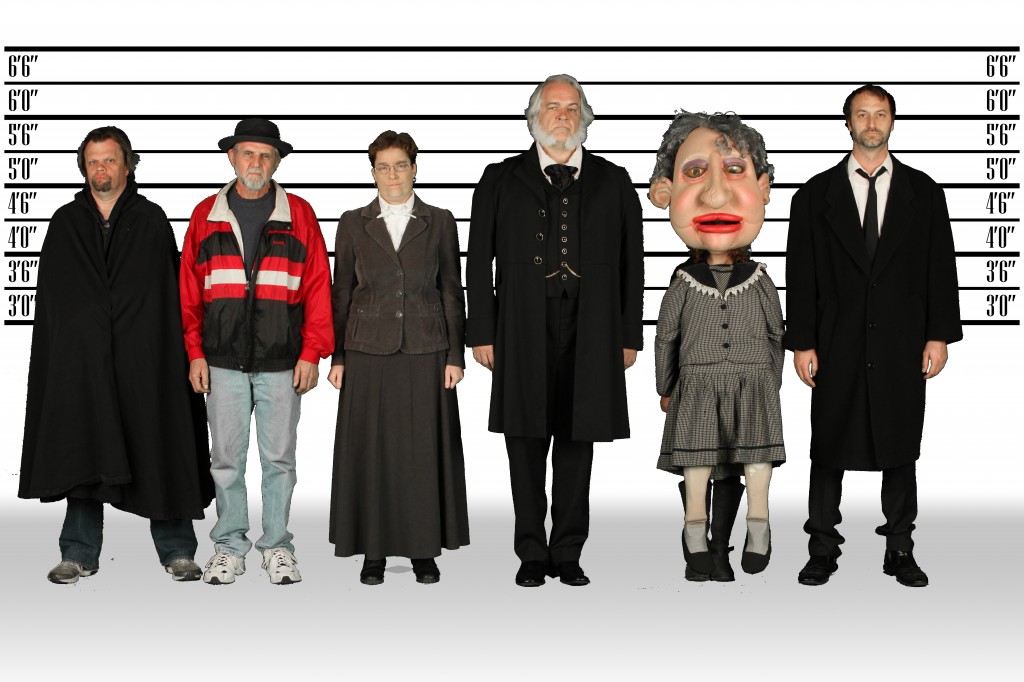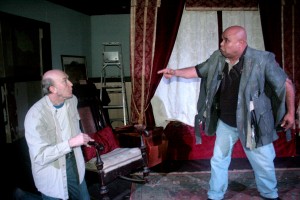

Nominal Christians (or “Chreasters” as some like to call them) are often derided for the practice of showing up to church once or twice a year at the Big Masses and calling it good for another trip around the sun. Likewise, even the most reluctant of theatergoers who pay lip service to the dramatic arts, but consider seeing Phantom at PPAC the equivalent of supporting local theater, raise an eyebrow from those who are regular attendees at the dozens of offerings available across the state all year. The common response from pastors and artistic directors alike is usually, “Hey, as long as they show up at all, we’re glad to have them.” Keeping Christmas in your heart year round is surely a Christian ideal and for many, a trip to see a production of A Christmas Carol fulfills a need both secular and parochial and becomes, like Midnight Mass, a family tradition that is annually anticipated.
If there’s a War on Christmas at the governmental level, then no one told the majority of Rhode Island theaters. The plethora of Christmas Carols (and Christmas-related productions) onstage in December is mind-boggling, yet almost predictable. In such a Catholic state, it’s a no-brainer to offer some holiday theater fare
 amidst the Nutcrackers and Coppelias and there are plenty of non-holiday offerings abound, but Rhode Island’s often absurd number of stages always has enough Dickens on display to keep the family in good cheer for years to come. So, why A Christmas Carol? Several plays exist that have similar themes and settings and offer, if not a new, than at least a fresher take than a story written before the Civil War. But even if we take the kids to see Ocean State Theatre do Miracle on 34th Street, The Musical it feels like a pleasant one-off, a diversion from a lineage. Hearing Paul’s letter to the Corinthians read aloud at a wedding is a cliché, but it is considered part of a longstanding tradition, not uninspired repetition. There may be cleverer, more ethereal and certainly funnier Christmas plays out there, but they always feel like side dishes to Dickens’ always satisfying main course.
amidst the Nutcrackers and Coppelias and there are plenty of non-holiday offerings abound, but Rhode Island’s often absurd number of stages always has enough Dickens on display to keep the family in good cheer for years to come. So, why A Christmas Carol? Several plays exist that have similar themes and settings and offer, if not a new, than at least a fresher take than a story written before the Civil War. But even if we take the kids to see Ocean State Theatre do Miracle on 34th Street, The Musical it feels like a pleasant one-off, a diversion from a lineage. Hearing Paul’s letter to the Corinthians read aloud at a wedding is a cliché, but it is considered part of a longstanding tradition, not uninspired repetition. There may be cleverer, more ethereal and certainly funnier Christmas plays out there, but they always feel like side dishes to Dickens’ always satisfying main course.

One of the reasons for Carol’s enduring popularity is that, whether we know it or not, our conception of Christmas in the modern Western world has been largely shaped by Dickens’ careful blend of spiritualism, social commentary and longstanding Old Christmas traditions that had largely fallen by the wayside when A Christmas Carol was first published in 1843. The novella was adapted for the stage by the end of the 19th Century (Seymour Hicks’ 1901 one-man version being the early prototype for many to follow) and countless iterations continue to this day. Look at the production history of any theater, anywhere, and you’re likely to find a past, present (or future) production of A Christmas Carol and/or one of its offshoots. Is it strictly the fact that, like Shakespeare, this public domain material can be adapted and staged at will without concern for royalties? Could such a crass commercial notion be behind the constant staging of a story that cries out against such blatant financial preoccupation?

Not so, according to Tyler Dobrowsky, director of the current version running at Trinity Rep. Trinity’s original version has long since become the gold standard for A Christmas Carol in Rhode Island, and while Adrian Hall’s 30-plus year adaptation is still the framework for Trinity’s production, each director takes his or her own stab at reinterpreting the script while keeping the necessary elements intact. “It’s something we take very seriously,” he says. “This is a tradition for many families in Rhode Island and Massachusetts, to celebrate the holidays. It’s an important show for us every year.” Dobrowsky maintains that, far from seeing Carol as some sort of yearly cash cow for Trinity, the theater eagerly anticipates the influx of families and schools that make the show part of their lives. And, much like the “Chreasters” with church, Christmas Carol may be the first or only time that many folks ever see live theater. For some children, such as those who visit as part of Project Discovery, Christmas Carol may be a gateway for them to explore an art form to which their exposure is minimal at best. “This is a gift we give to the people of Rhode Island every year,” says Dobrowsky. More than simply a production, Trinity decorates the entire theater, arranges fundraising (Trinity has raised almost $250,000 for the RI Food Bank from Carol-related donations alone) and generally feels “responsible” for making their Christmas Carol an experience, not just a show. The yearly changes are not for the sake of tinkering, but to offer more to those who come year after year. With Fred Sullivan, Jr. taking on the role of Scrooge this year, it’s a fresh look for those who got used to Timothy Crowe in the lead. The Ghosts have been updated and new music and choreography added, so even though many folks have seen the show over the course of decades, there is always a new take backed by Trinity’s considerable ability to deliver high production value.
Yet even with Trinity leading the way, several other companies feel just as strongly about the seasonal as well as the artistic merit of staging a show that seems to be playing on every corner. JC Wallace, who heads the Rhode Island Shakespeare Theatre, is staging an ambitious version of Carol in conjunction with the Big Nazo Puppet Lab. The ghosts are all Nazo creations, while Wallace himself tackles Ebenezer as well as directing. Wallace was looking for a way out of the usual takes on Carol, and knew that the Courthouse Theater in Kingston would not allow him room for much in the way of Trinity-esque special effects. So, he approached Nazo with the idea of a collaboration and they jumped aboard to help create one of the most unique Carols running this year. His script aims for irreverence and humor while keeping true to the main themes. He describes Courthouse’s version as “meta-aware, with topical references and a set that looks more like a cartoon, modern.” Wallace is looking for a “community flavor, inviting the audience into the show” as opposed to a more traditional, fourth wall-style of presentation. Opening on December 5, Courthouse is pushing hard for a “must-see” event and an alternative, yet complementary version for South County audiences to what Providence has to offer, with carolers, shopping opportunities and Santa himself appearing on December 7.
Another longstanding adaptation is presented by the Artists’ Exchange, who go into their 10th year presenting Christmas Carol in Cranston. Opening December 12, this version, helmed by Clara Weishahn, aims to achieve an open journey where the considerable cast, led by Tom Chace as Scrooge, starts off as a modern family, telling the tale in a living room (much like Dickens himself would read his story aloud as family and friends gathered) and transform, scene by scene, into Victorian England. “This version is essentially the novel,” says Weishahn. “What got me excited was the idea of this story being told here and now, shared by children, aunts and uncles all in the same room.” Like Wallace, Weishahn wants her theater to play to its strengths, incorporating actors from the Gateways to Change program into the ensemble. Local Cranston residents and children are all part of the production, making this Carol for and by the community it serves. In the second weekend, they move from the 82 Rolfe Square location to the grandeur of The Park Theatre, utilizing large-scale backdrops and scenic elements not available to them in the smaller space at # 82. “We’re trying to invoke the mood and feeling of the emotional quality of Dickens’ world, and the visuals reflect how a child might imagine this story as they hear it,” says Weishahn. Chace also lends his considerable musical talents to the production, with live contemporary music mixed with period Victorian Christmas offerings.
And while theaters like David Jepson’s The Granite in Westerly (Nov 29 through Dec 22) and Encore Rep in Woonsocket (Dec 6 through 15) are staying close to their traditional productions, others have been busy making a tradition out of being more, well, untraditional. Frank O’Donnell’s A Christmas Carmella directly parodies Dickens while retaining the original’s spirit. “My goal three years ago was to create a fun holiday alternative to A Christmas Carol,” says O’Donnell. “All of the sudden, I’ve got a franchise on my hands with Ant’ny Claus. Trinity owns (Christmas Carol), if you ask me, but it seems like so many others do it as well, to the point that, for a while, A Christmas Carol was literally the only show in town.” This very Rhode Island version of the story is fast becoming an alternative for those who like a little fuggedabowdit with their spirituality, and O’Donnell opens Carmella at Theatre Works in Woonsocket December 6 through 15. Mark Anderson, who also serves at Theatre Works’ president and plays Carmella’s version of Scrooge, Scrungini, says, “The first two Ant’nys broke all sorts of box office records for us. If we get a threepeat that would be perfect!” Other amusing alternatives include a Murder Mystery version by Providence’s Murder on Us (A Deadly Christmas Carol), which has been running for more than 20 years.
Space precludes mentioning all of the versions of Carol running in and near the state, but all share the same message: we are responsible for other people, especially those less fortunate than ourselves. “The choices we make in life affect other people,” stresses Tyler Dobrowsky. And, for at least one time a year, A Christmas Carol and its offspring brings families and communities together to acknowledge and share that spirit. And, for the theatrical “Chreasters” that only see one show a year, the message of spiritual redemption and rebirth at a time when the season is about to change is a double shot of Christmas and Easter rolled up in one. A Christmas Carol is a familiar, yet constantly evolving tradition here in Rhode Island and for at least one time a year, we’re all season subscribers.